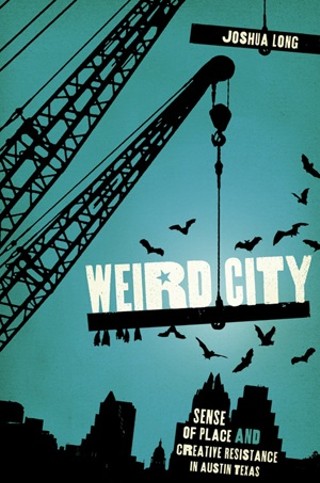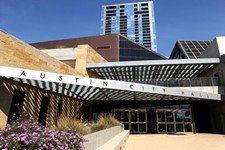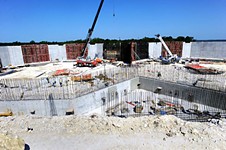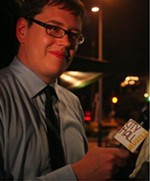The Daily Hustle: 6/3/10
TDH gets ethnographic with Joshua Long
By Wells Dunbar, 7:26AM, Thu. Jun. 3, 2010

The Hustle's got something a little different today.
In the Books department this week, you can read my interview with Joshua Long, author of Weird City. As Josh's answers were so great – and politically relevant – TDH has the extended interview below the fold.
An ethnographic study about how we develop a “sense of place,” and what happens when that sense is threatened by change, Long's tome began as a thesis. It's a scholarly but entertaining approach to Austin history, and the growth wars that have dominated it over the last two decades. We spoke with Long via email from Switzerland, where he currently teaches.
Austin Chronicle: I have to applaud the rigorous, academic framework you approach the topic with, because otherwise it could’ve turned into a travelogue, or collection of anecdotes. As it began as a thesis, were you concerned about the academic trappings when in turned into a book?
Joshua Long: Trappings indeed. I wanted to write to Austinites, but I wanted to also write something that would spark discussion in a college classroom. So maintaining the balance was tricky. This was an issue early on.
When I started out, it was not my intention to turn the dissertation into a book. Many dissertations are written in disciplinary jargon and later chopped into journal articles, but that just didn’t fit this project. Austin is a well-educated and informed city, but Austinites don’t want to be talked down to. If I spewed a bunch of erudite tripe from atop the ivory tower, they’d call me on it. Austin is a place that requires a narrative description. I had a very supportive academic adviser who saw the advantages in taking that approach. At first, this didn’t sit well with a couple of my other committee members, so there was a compromise. They made sure that there were sections that maintained the methodological rigor that is so important to ethnographic research, and I got to write the rest of the dissertation in more of a mainstream voice. So, sections were either rewritten or partially omitted from what you see in print. For instance, the reader won’t see the demographic analysis of interviewees, the detailed methods section, the lengthy literature review, or the wordy theory section. These were greatly summarized and most of it was placed at the back of the book. UT Press liked the idea. They are an academic press and wanted to make sure that it maintained scholarly integrity, but they also know Austin and understood why I wanted to make it appeal to a larger audience. The manuscript was sent out to peer reviewers who made some great critical suggestions on how to achieve this balance.
AC: You make the point that Austin’s definitely weird – the vignettes regarding toilet yard art, Nik the Goat, and Leslie Cochran testify to that – but also that Austin faces many of the same challenges as other cities around the country, namely addressing growth while maintaining a sense of place.
JL: Yeah, there is definitely something different about Austin, but that doesn’t mean that it is the only city dealing with growing pains and homogenization. This may explain why there are so many other “Keep ______ Weird” slogans out there. Boulder, Portland, Santa Cruz, Louisville, Asheville, and dozens of other cities are begging residents to keep it weird. In the past twenty years or so it seems that more and more cities have begun to look like replicas of the same SoCal strip mall. The occasional big box store or restaurant chain isn’t a bad thing, but when you have a cookie-cutter landscape of Pottery Barns, REIs, and Olive Gardens, cities stop looking like individual places and instead start looking like landscapes of American mass consumerism. Don’t get me wrong. I’m no anti-capitalist. But I am a bit worried that we are too often sacrificing the diversity of the American cultural landscape for the sake of cheap shiny convenience.
All of this, of course, goes beyond landscape homogenization. There are serious social costs associated with rapid growth and downtown revitalization. Many of my interviewees didn’t have time to worry about saving a dive bar or an iconic restaurant. They were far more concerned with the cost of their rent and their property taxes, and as you know, this hits some communities harder than others. There are also serious environmental costs associated with rapid growth that need to be taken into consideration, but I fear I am starting to sound preachy…
AC: How do you personally feel the city’s doing with regard to keeping Austin weird? It almost seems any formalized stance to preserve “iconic” locales – the controversial and subsequently abandoned loan to Las Manitas, for instance – run the risk of institutionalizing and co-opting what made the place special in the place. It’s almost analogous to the “Great Cities” dilemma you discuss, or gentrification in general, when a desirable community becomes overpopulated and altered, robbing it of what made it desirable in the first place.
JL: I have family that live and work in the Austin area, so I go back as often as possible. I notice little things that make me worry about the loss of weird. There seems to be more self-conscious hipsters fine-tuning their espresso orders and fewer unconscious slackers pooling money for backyard Christmas lights. The occasional “Keep Austin Weird” bumper sticker attached to the Lexus in the parking lot of the Bee Caves Barnes & Noble concerns me. And it is starting to seem like every other story I read about Austin has something to do with a Barton Springs closure due to wastewater, construction runoff, or bescumbering morons with wrenches. Despite all that, there is still something very special about Austin and I can’t help but think that I would like to get back there someday. The thing is, if that happens, I might just be further contributing to the problem. I mean, I’ll be one of those newcomers driving up your rent, cutting you off in traffic, and stealing your table at Jo’s or Spiderhouse. If I do ever return to Austin, I promise I won’t live in a McMansion or pee in Barton Springs. Deal?
AC: The current “weird” rallying point in Austin is the Cactus Cafe, the music venue in UT’s student union. After administrators proposed its closure, massive community outpouring lead to plans to keep it open. But a criticism levied at supporters was that had a fraction of Cactus supporters patronized or supported the club more often, it wouldn’t have been endangered. I wonder at what point does attachment to a sense of place turn into an overarching and possibly unhealthy nostalgia. As we both know, Austin has a pronounced case of “You shoulda been here when…”
JL: Well said. This is such a good question. There is no doubt that many Austinites over-romanticize the past, and a few of my interviewees were justifiably concerned that the city’s anti-growth mentality serves as an obstacle to good planning policy. But I have to say, that during research I loved hearing the “You shoulda been here when…” whine. I literally saw tears well up in people eyes when they talked about Armadillo World Headquarters or Liberty Lunch or Treaty Oak. It just shows how passionately people feel about Austin. Yes, of course, that can be a real thorn in the side of policy makers. The ghost of Austin past is the cold sweat that frequently wakes city council members from an otherwise peaceful sleep. But I’d like to think that when the oh-so-vocal “keep it weird” camp picks a battle with the pro-development side, the attention from the conflict tends to make government a little more transparent. By being involved, informed, and vocal, Austinites make everything a little more democratic. Or maybe now I’m just over-romanticizing…
On a similar note: I think we both know that Austin stands to gain an awful lot from being weird. From candlelight vigils for Treaty Oak, to Cathedral-O-Junk structural permits, to the battle over Las Manitas, there is an awful lot of media coverage of weird Austin. That’s solid PR that can positively influence everything from tourism to sustainable development. When all eyes are on Austin, it keeps city governance and the city populace on their toes.
AC: Elsewhere you note the “Keep Austin Weird” evolution from rallying cry to trademarked slogan mirrors the fears people have about the city’s changes – condo development Downtown, rising property taxes, and loss of character and place. Is there a better call-to-arms for Austin today?
JL: This cracks me up, because I asked the same question so many times of people and got some great responses. They ranged from “Keep Austin Cool” to “Don’t Mess with Austin,” to “Keep Austin’s Balls” (the latter was from Eddie Wilson…he later changed his statement to “Keep Austin’s Balls Ben-Wa”). But the best response was just “Keep Austin.” I know that pretty much sums up how I feel about the city.
Got something to say on the subject? Send a letter to the editor.
A note to readers: Bold and uncensored, The Austin Chronicle has been Austin’s independent news source for over 40 years, expressing the community’s political and environmental concerns and supporting its active cultural scene. Now more than ever, we need your support to continue supplying Austin with independent, free press. If real news is important to you, please consider making a donation of $5, $10 or whatever you can afford, to help keep our journalism on stands.
Austin Sanders, Oct. 27, 2019
Richard Whittaker, Oct. 3, 2016
Bonny Chu, Nov. 30, 2018
Richard Whittaker, Oct. 7, 2015
The Daily Hustle, Development, Environment, Weird City, Joshua Long, Interview












